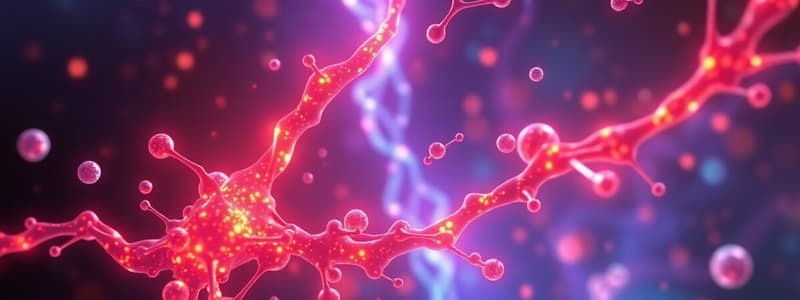Podcast
Questions and Answers
Which of the following anorectic agents is noted for its high risk of causing cardiac issues and potential for abuse?
Which of the following anorectic agents is noted for its high risk of causing cardiac issues and potential for abuse?
- Dexfenfluramine
- Sibutramine (correct)
- Phentermine
- Fenfluramine
What is the primary use of Methylphenidate?
What is the primary use of Methylphenidate?
- Asthma management
- Attention Deficit Hyperactivity Disorder (correct)
- Bladder relaxation
- Antiobesity treatment
Which medication is classified as a B3-agonist and is used for bladder relaxation?
Which medication is classified as a B3-agonist and is used for bladder relaxation?
- Dexfenfluramine
- Salbutamol
- Methylphenidate
- Mirabegron (correct)
What condition is Ephedrine primarily used to treat?
What condition is Ephedrine primarily used to treat?
Which of the following agents is NOT typically used for managing hypertension?
Which of the following agents is NOT typically used for managing hypertension?
What is the primary action of B-agonists in asthma treatment?
What is the primary action of B-agonists in asthma treatment?
Which class of drugs is characterized as sympatholytics?
Which class of drugs is characterized as sympatholytics?
What side effect is commonly associated with the use of non-selective beta blockers?
What side effect is commonly associated with the use of non-selective beta blockers?
What is one of the benefits of cardioselective medications for asthmatic patients?
What is one of the benefits of cardioselective medications for asthmatic patients?
How do cardioselective medications affect diabetic patients?
How do cardioselective medications affect diabetic patients?
What condition is not associated with the side effects of cardioselective medications?
What condition is not associated with the side effects of cardioselective medications?
Which cardiac condition is treated with cardioselective medications?
Which cardiac condition is treated with cardioselective medications?
Which of the following is a non-cardiac use of cardioselective medications?
Which of the following is a non-cardiac use of cardioselective medications?
In patients with COPD, what is the advantage of using cardioselective medications?
In patients with COPD, what is the advantage of using cardioselective medications?
What is an important consideration when prescribing cardioselective medications to athletes?
What is an important consideration when prescribing cardioselective medications to athletes?
What type of arrhythmia can cardioselective medications help manage?
What type of arrhythmia can cardioselective medications help manage?
What is a concerning side effect of cardioselective medications that should be monitored?
What is a concerning side effect of cardioselective medications that should be monitored?
Which statement about cardiac uses of cardioselective medications is incorrect?
Which statement about cardiac uses of cardioselective medications is incorrect?
Which of the following conditions is a contraindication for cardioselective medication use?
Which of the following conditions is a contraindication for cardioselective medication use?
What parameter might be decreased in patients using cardioselective medications?
What parameter might be decreased in patients using cardioselective medications?
Which potential risk is NOT associated with cardioselective medications?
Which potential risk is NOT associated with cardioselective medications?
For which of the following conditions would cardioselective medications NOT provide a therapeutic benefit?
For which of the following conditions would cardioselective medications NOT provide a therapeutic benefit?
Flashcards are hidden until you start studying
Study Notes
Anorectic Agents
- Anorectic agents are used to treat anorexia and obesity.
- They act on the hypothalamus at the satiety center.
- Common anorectic agents include phentermine, phenylpropanolamine, sibutramine, fenfluramine, and dexfenfluramine.
- Sibutramine is no longer used due to cardiac risks and potential for abuse.
CNS Stimulants
- CNS stimulants are used to treat conditions such as ADHD and narcolepsy.
- Methylphenidate is the drug of choice for ADHD and is also abused by athletes.
- Ephedrine is another CNS stimulant that is abused by athletes. It is also a drug of choice for narcolepsy.
- CNS stimulants can cause fatigue and improve performance on cooperative tests.
B-Agonists
- B-agonists are bronchodilators used to treat asthma.
- Salbutamol is a commonly used B-agonist.
- Some B-agonists are also used as uterine relaxants (tocolytics) for conditions like COPD.
- Examples of uterine relaxants include ritodrine and isoxuprine.
- They are used to delay labor.
B3-Agonist
- Mirabegron is a B3-agonist that acts as a bladder relaxant.
- It is used to treat overactive bladder.
- Mirabegron may also have antiobesity potential but is not currently approved for obesity treatment.
Imourably Acting S.Mimetis
- These agents mimic the effects of the sympathetic nervous system.
- They include:
- Tricyclic Antidepressants (TCAs)
- Serotonin-Norepinephrine Reuptake Inhibitors (SNRIs)
- Cocaine
- Tyramine
- Ephedrine
Sympatholytics
- Sympatholytics directly or indirectly decrease sympathetic nervous system activity.
- Direct sympatholytics act directly on the sympathetic nervous system, relieving vascular outflow obstruction.
- Indirect sympatholytics act on the [JMA ax] pathway, which indirectly impacts sympathetic activity and causes vasodilation.
Miotics and Their Use in HTN and BPH
- Miotics are a type of sympatholytic that is used to treat hypertension (HTN) and benign prostatic hypertrophy (BPH).
- Common miotics include:
- Terazosin: Less risk of hypotension, but there is a risk of first-dose syncope.
- Doxazosin: Used for both HTN and BPH. Minimal dose should be taken at bedtime to prevent hypotension.
- Tamsulosin: Used for HTN in patients with dyslipidemia.
- Silodosin: Used for BPH.
Side Effects of Sympatholytics
- Side effects of these medications include:
- Hypotension (postural)
- Ejaculation failure
- Retrograde ejection (urine flowing back into the bladder)
- Floppy eye syndrome (miosis)
Non-Selective Beta Blockers
- Non-selective beta blockers block both β1 and β2 receptors.
- They are available in two forms:
- Im-prodrug (slow): Phenoxybenzamine
- Rever (faster and short): Phentolamine, Tolosalde, Phenoxybenzamine (to control BP)
- They are used to treat HTN. However, they are not used for PVD due to their risk of hypotension.
Selective Beta Blockers
- Selective beta blockers block primarily β1 receptors.
- Common selective beta blockers include:
- Cardioselective: Atenol, Acebutolol
- B2 Selective: Betaxolol
Metoprolol, Ermolol, Nebivol
- These are specific types of cardioselective beta blockers that have the following advantages:
- No risk for asthmatic patients or patients with COPD.
- No suppression of gluconeogenesis in patients with diabetes.
- Safe for diabetic patients and do not increase dyslipidemia.
- No risk of uterine obstruction.
- No risk of glycogenesis in skeletal muscle.
Uses of Beta Blockers
- Beta blockers are widely used for both cardiac and non-cardiac purposes.
- Cardiac uses of beta blockers include:
- Treatment of MI, angina, and HTN.
- Treatment of heart failure and arrhythmias.
- Non-cardiac uses of beta blockers include:
- VD (vasodilation)
- Fentotamise
- Deforest
- LA (local anesthesia)
- Glaucoma
Studying That Suits You
Use AI to generate personalized quizzes and flashcards to suit your learning preferences.




